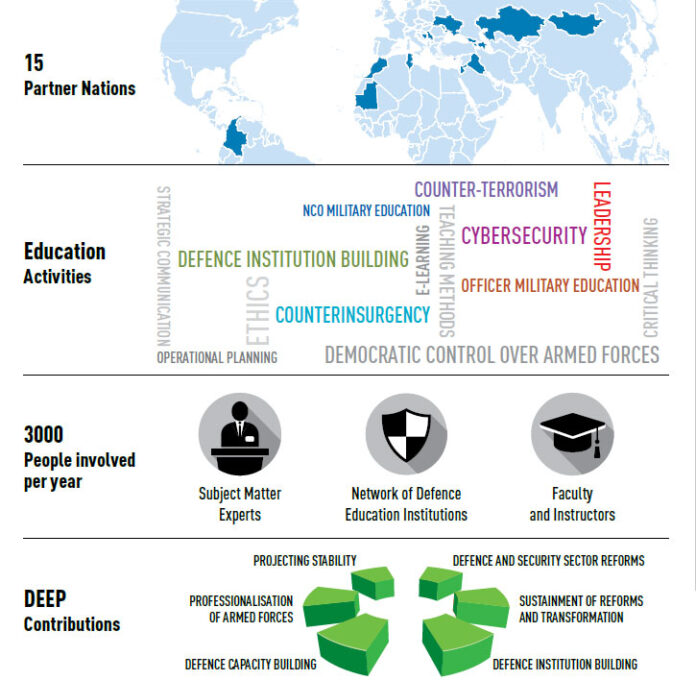The Defence Education Enhancement Programme (DEEP) is a NATO-led initiative designed to assist individual countries in reforming and modernising their professional military education institutions. Through tailored faculty development, curriculum improvement, and peer-to-peer engagements, DEEP fosters defence capacity building and institutional development. By strengthening democratic defence structures, the programme contributes significantly to NATO’s efforts to project stability across the Euro-Atlantic region and beyond.
Objectives and Approach
DEEP is a demand-driven programme, responding to the specific educational and institutional needs of individual nations. Each initiative is grounded in bilateral partnership agreements between NATO and participating countries. The programme offers expert guidance to defence institutions aiming to become intellectually interoperable with NATO standards. Over 900 experts from 75 defence and security education institutions collaborate with DEEP to support modernisation efforts.
Countries currently benefiting from DEEP include Armenia, Azerbaijan, Bosnia and Herzegovina, Colombia, Georgia, Iraq, Jordan, Kazakhstan, Mauritania, Moldova, Mongolia, Morocco, Serbia, Tunisia, and Ukraine.
Core Components: Curriculum and Faculty Development
- Curriculum Development: DEEP works closely with partner countries to develop and enhance curricula tailored to the needs of professional military education institutions. NATO and the Partnership for Peace Consortium (PfP) have produced reference curricula on topics such as Defence Institution Building, Cybersecurity, Counter-Terrorism, and Hybrid Warfare. These resources help shape relevant, modern educational content in partner nations.
- Faculty Development: The programme focuses on empowering educators with advanced pedagogical tools and methods. This emphasis on innovative teaching fosters critical thinking and modern instructional techniques in the classroom. NATO and the PfP have also developed a comprehensive Faculty Development Curriculum Guide to support these initiatives.
Institutional Adaptation
Beyond curriculum and teaching methods, DEEP helps modernise the organisational structures of military education institutions. This includes building quality assurance systems, improving the roles of Non-Commissioned Officers (NCOs), and enhancing command team structures. DEEP’s initiatives for NCO development aim to professionalise military education, further aligning it with NATO’s broader strategic goals.
Advanced Distributed Learning (ADL) Portal
The DEEP ADL Portal serves as a platform for knowledge exchange and collaboration on distance learning. It enables deeper cooperation and dissemination of educational best practices, making use of new technologies to extend the programme’s reach.
Measuring Success
The success of DEEP initiatives depends largely on the efforts made by partner institutions to implement the programme’s recommendations. Key indicators of success include:
- Adoption of modern professional military education structures.
- Integration of new curricula and teaching methodologies.
- Development of a professional NCO Corps.
- Long-term institutional self-sufficiency in military education.
Evolution of DEEP
DEEP was developed in 2007, following the launch of NATO’s Partnership Action Plan on Defence Institution Building (PAP-DIB) in 2004. This framework was designed to assist partner nations in reforming their defence institutions. Over the years, DEEP has expanded to provide education, training, and capacity-building support to a growing list of countries, with an emphasis on building stronger defence institutions, improving governance, and enhancing resilience.
Conclusion
DEEP continues to play a vital role in modernising defence education systems worldwide, ensuring they are responsive to the complex challenges of global security. By fostering collaboration, enhancing professional military education, and supporting institutional reform, DEEP helps partner countries build stable, self-sustaining military education systems aligned with NATO’s strategic objectives.











